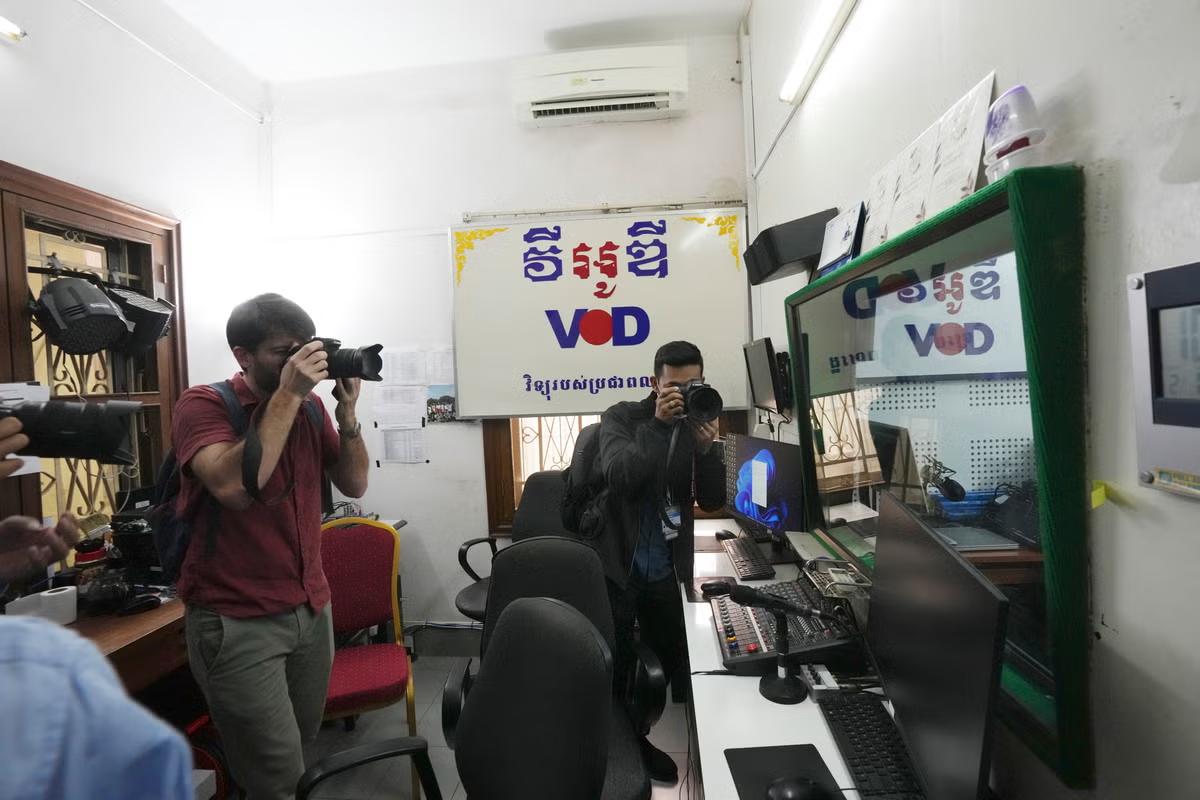
Cambodia’s prime minister Hun Sen shut down one of the last few independent media outlets in the country on Sunday with less than six months to go until a general election.
The prime minister ordered the immediate revocation of Voice Of Democracy‘s (VOD) operating licence after the outlet published an article that he claimed intentionally slandered his son.
The move has been termed alarming by human rights and journalist groups both locally and internationally. Amnesty International said in a statement: “This is a blatant attempt to slam the door on what’s left of independent media in the country, and a clear warning to other critical voices months before national elections.”
Hana Young, Amnesty International’s deputy regional director covering Cambodia, said: “Arbitrarily shutting down an outspoken media organisation will have an immediate chilling effect on anyone who still dares to ask questions about the actions of the Cambodian government.
“It also comes against a backdrop of ongoing repression against anyone remotely critical of the prime minister and his family.”
Amnesty urged Hun Sen to “immediately withdraw this heavy-handed and disproportionate order”.
The article published by VOD related to the prime minister’s eldest son, Hun Manet, who is also the deputy commander of the country’s armed forces and seen as Hun Sen’s heir designate. It reported that Hun Manet had signed a government aid agreement to donate $100,000 to Turkey for earthquake relief – a presumed breach of government protocol.
The article claimed that the leader’s son signed the document on behalf of the prime minister [his father]. Hun Manet has denied approving the aid.
The Cambodian leader said that the article had hurt the “dignity and reputation” of the Cambodian government.
Cambodia’s Information Ministry said on Monday that VOD’s licence was being revoked “because it has seriously violated the ethics of professional journalism and did not make a correction according to the press law, affecting the honour and prestige of the government”.
VOD issued a statement after the government denied its story, saying it was “regretful for the confusions” regarding the article but stopping short of an apology. In a statement, its publisher the Cambodian Centre for Independent Media [CCIM] said: “VOD always follows the principles of the journalistic code of conduct. Once again, VOD expresses regret and asks forgiveness if [VOD] has done any unintentional wrong-doing to Samdech Prime Minister.”
In the early hours of Monday, Hun Sen’s office rejected this statement and criticised its careful wording, writing on his official Facebook page: “In the name of the government, which has to protect its dignity, I decide to end the case by ordering the information ministry to cancel the licence for VOD from now on and that it stop broadcasting by 10 am.”
Hun Sen said he could “not accept the term ‘regretful’ and the request for forgiveness instead of an apology”.
Cambodia’s minister of information Kanharith posted on his Facebook page that other media outlets should take note of the fate of VOD. “It is a lesson learned for other media institutions,” he said. “The media institutions that do not agree to publish clarifications, [they] will face the revocation of their licences.”
Local media reported that the police on Monday morning blocked the road outside VOD’s office in Phnom Penh, while serving them a notice informing the outlet of the revocation of its licence.
Many reported on Twitter that the VOD websites could not be accessed from within Cambodia on Monday.
CCIM’s media director Ith Sothoeuth told reporters he was still hopeful that the publication would win a reprieve.
CCIM was founded in 2007 to promote “independent media, press freedom, freedom of expression, access to information and internet freedom”.
Prior to the shutdown of VOD, the Cambodian government had closed down at least two major independent newspapers in the last decade. Cambodia Daily was forced to close in 2017 after being presented with a massive unpaid tax bill, and the Phnom Penh Post was sold under government pressure to investors from Malaysia.
Phil Robertson, deputy Asia director for Human Rights Watch, said in a statement that “the Cambodian government has never liked VOD’s reporting and given prime minister Hun Sen’s authoritarian attitude towards independent media it’s likely VOD has been living on borrowed time for a while”.
Camboja News reported that the female VODKhmer journalist who authored the article was harassed on social media by the prime minister’s supporters. It said that the journalist was facing misogynistic vitriol and sexual harassment on social media platforms.
Cambodia will go to the polls in July, though observers say there is little prospect of anything other than a victory for the CPP party led by Hun Sen, who has held the office of prime minister 1985. CPP took around 80 per cent of the vote in the last election in July 2018, which rights groups condemned as a sham.
In the run-up to the elections, senior figures from the opposition CNRP party have been served with lawsuits, arrests and intimidation.
Journalist Alex Willemyns, who co-founded VOD English in 2019, told Al Jazeera that VOD had become “Cambodia’s news service of record” and would be sorely missed. “Besides the obvious loss of its independent perspective on the big news of the day, there will be no one else left to consistently cover the small stories it covers each day that together become the kindling of the bigger stories,” he said.
Chak Sopheap, executive director at the Cambodian Centre for Human Rights, told ABC News that the shutdown was the latest in “a series of anti-democratic moves”. She warned that as long as the government “perceives the expression of criticism as a crime, freedom of expression will continue to exist only as a mere aspiration in Cambodia”.







